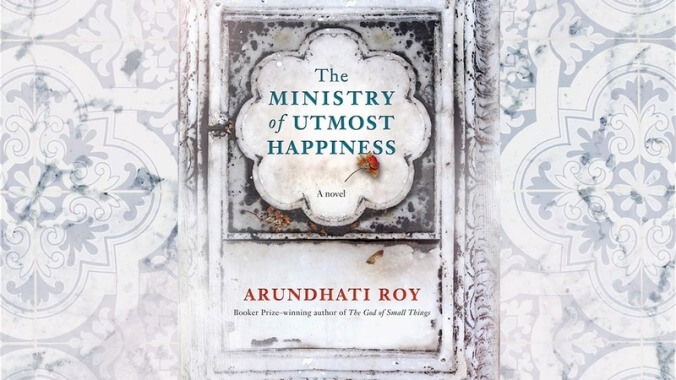Arundhati Roy’s The Ministry Of Utmost Happiness never figures out what kind of novel it wants to be

In the 20 years since she won the Man Booker Prize for her debut novel, The God Of Small Things, Arundhati Roy has written only non-fiction. She authored editorials about Kashmiri separatism, criticized neoliberal economic trends in post-millennium India, and publicly lamented the then-nomination of Narendra Modi for prime minister as “a tragedy.”
Perhaps it’s the plethora of issues and stances that lend her second novel, The Ministry of Utmost Happiness, a kind of genre and narrative schizophrenia. What begins as a compelling tale of Anjum, a Muslim trans woman eking out a life in Old Delhi—botched hormone injections, familial wrath, prostitution—turns into a wide swath of narrative non-fiction, with no particular subject or theme in mind. Pollution and poverty are targeted just as much as the “saffron parakeets,” Roy’s term for the Hindu nationalists who aided Modi’s rise to power. She is at her incisive best when taking on globalization and its disaffected in Delhi:
“Where shall we go?” the surplus people asked. “You can kill us, but we won’t move,” they said. There were too many of them to be killed outright. … All day long the roads were choked with traffic. The newly dispossessed, who lived in the cracks and fissures of the city, emerged and swarmed around the sleek, climate-controlled cars, selling cloth dusters, mobile phone chargers, model jumbo jets, business magazines, pirated management books… The passengers looked out of their car windows and saw only the new apartment they planned to buy, the Jacuzzi they had just installed and the ink that was still wet on the sweetheart deal they had just closed. They were calm from their meditation classes and glowing from yoga practice.”
The influence of authors both dead and alive are evident in Ministry, but Roy’s prose fails to elevate or create insight. Indian Intelligence Bureau Officer Diplab Gupta’s portion of the novel, written in the first person, echoes Jennifer Egan’s A Visit From The Goon Squad as it splinters into mixed-media branches. Included in his narrative are asylum applications, memos of coerced confessions, manifestoes, and glossaries, all left behind by a vanished tenant, who was also a college classmate. So voluble and detailed is Gupta’s story that it would be better off as its own novel. Where Egan employed challenges to the novel’s traditional form with precision and ease, Roy sledgehammers the floodgates open, turning the prose into a primordial soup that makes it difficult to properly track a story arc, let alone care about it.
It’s a strange point in the book for Roy to disregard narrative control but that’s exactly what she does: “In this way the insurrection began. Death was everywhere. Death was everything. Career. Desire. Dream. Poetry. Love. Youth itself.” Shades of Jhumpa Lahiri’s The Lowland also emerge toward the novel’s final 80 pages, as the narrative shifts, without warning, to the Naxalite movement in eastern India. But Lahiri is a master of narrative distance, while Roy almost crudely employs an epistolary section as a hurry to the finish line. Joseph Heller might approve of passages like the following but even that wouldn’t redeem Ministry: “The summer of the city’s resurrection had also been the summer of scams—coal scams, iron-ore scams, housing scams, insurance scams, stamp-paper scams, phone license scams, land scams, dam scams… in which politicians, businessmen, businessmen-politicians and politician-businessmen had made off with unimaginable quantities of public money.”
And this is to say nothing of Gupta’s vanished tenant, one S. Tilottama, who, when the reader first meets her, has kidnapped an abandoned baby in the middle of Delhi. Roy then inserts Tilo’s story, which would help fill in gaps and answer questions left by Gupta’s story, if by that point anyone has the strength or interest to continue.
Roy has penned several screenplays, and sometimes bits of dialogue provide much-needed relief from the ponderous and occasionally purple prose. While teasing a housemate, Anjum says, “Do you make all your life’s decisions based on mobile phone videos?” The housemate’s name, by his own choosing, is Saddam Hussain; of this choice he says, “I want to be this kind of a bastard. I want to do what I have to do and then, if I have to pay a price, I want to pay it like that.” At least the non-dictator Saddam Hussain knows what he wants. Unfortunately, his creator doesn’t know what sort of novel to write.
Purchase The Ministry of Utmost Happiness here, which helps support The A.V. Club.